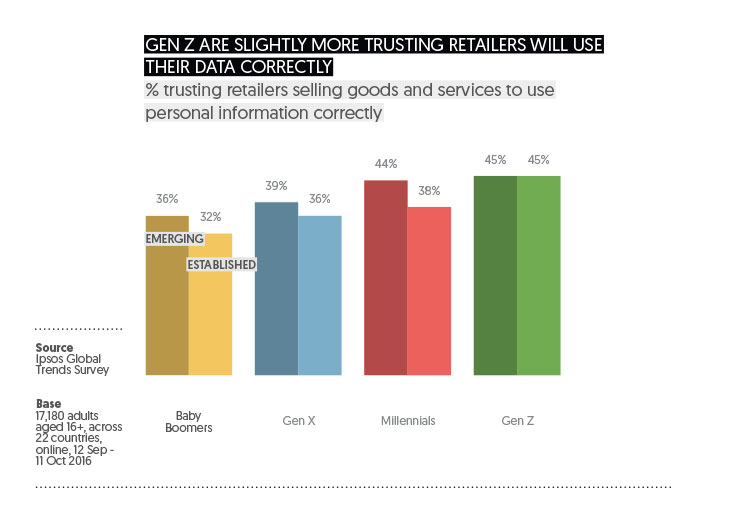
This week's blog post is contributed by guest writer, Chloe Cunningham. Chloe is the Sales & Marketing Intern at NaviStone and an Honor student at the University of Cincinnati, Carl H. Lindner College of Business. She is also a proud member of Generation Z.
Data Privacy from a Gen Z Perspective
As a Gen Z, I’ve grown up surrounded by a world personalized to me. From the age of 10, when I had my first iPod, I could change just about any detail of my device exactly how I wanted. My home screen was a picture of Kim Possible- my favorite show at the time- but my lock screen was a picture of my dog. That was precisely how I wanted it. As I’ve gotten older, the opportunities to personalize my life have grown exponentially. Customization has become a critical component to almost every aspect of my life.
Now I am a 19-year-old college student. I have an income of my own, money to spend! This means I am a key target for marketers across the board. Living in a world of growing technology, I have watched ads become more and more personalized to my interests. At times I find it convenient, it’s almost as if the internet is doing my research for me. And sometimes it becomes creepily accurate. We’ve all had that moment where we are craving a bag of Nacho Cheese Doritos and within minutes an ad for Doritos pops up on our phone. It is almost as if somebody can watch us through our screens and know exactly what we want, when we want it.
From a Gen Z perspective, this isn’t always a bad thing. It can be convenient and intriguing to find new companies and products that fit our interests. And oftentimes, we brisk past these painstakingly accurate advertisements. It is on occasion that we sit back and question, “how do they get this information?” So when do companies cross the line when it comes to our privacy? In my opinion, it is when we start to feel like an object. As the generation nicknamed “iGen”, it’s already a given that our information is almost constantly being collected by our devices. It is inevitable that our ads will become more personalized to us the more time we spend on the internet. But when our personal information is being sold between companies behind our backs, that is when we really become skeptical of companies true intentions.
"Gen Z appreciate it when data adds value to their lives—and hate it when it fuels predatory practices by big tech companies.”
Savannah Rabin, Strategist, R/GA, Los Angeles
Data suggests that my generation as a whole is less likely to worry about how our personal information is being traded. But this does not make our personal information any less important to us. Instead, we are putting more trust in companies to use our information in a professional and secure way. Technology has been on an exponential boom for years. We are keeping the expectation that companies will collect our information in a safe way that will also benefit us by personalizing our lives to our interests, no matter how much technology continues to grow in our lifetime.

Cite: Ipsos Global Market Research
As Ipsos has been able to demonstrate in their recent studies, people have become more trusting in companies to handle personal information over the years. By now, it is expected that companies that collect this information online have a clear commitment to our privacy. And even further, it is expected that companies make a constant effort to follow through with their promise to protect consumers. In order to meet the demands of each generation, companies must find a healthy method that balances consumer privacy and data personalization.
As a marketing student, I study the algorithms that companies use to target different consumers. And as a Gen Z looking for job experience, I knew to keep an eye out for any company that really puts their customers first. That’s one aspect of NaviStone that really stuck out to me. When working with such large amounts of data, it is so important to maintain a secure commitment to consumer privacy.
Our patented technology at NaviStone ensures that we don’t house personal information about consumers. Using a “double-blind” marketing system keeps each consumer’s personal information protected throughout the entire data collection process. If we aren’t confident that our products will benefit our consumers, we don’t market it. This is the type of integrity we Gen ZERS expect of companies. Autonomy and control of our own information is critically important. So is ease and relevant information about things that we enjoy. That is the purpose behind NaviStone’s postcards.
In today’s world, data personalization has become normalized and data protection is still expected. Generation Z anticipates that their online presence will be customized to their interests. And people of all ages continue to hold companies responsible for their actions when collecting information. NaviStone has nailed a secure data collection process that provides consumers with a personalized shopping experience while upholding the highest standards of consumer privacy.

Lookalike Audiences Enhance customer acquisition by identifying high-potential prospects, boosting response rates, and lowering advertising costs.
Retargeting Postcards Double the performance of your direct mail retargeting.
Amplify Recognize unknown visitors who are actually customers. Add 20-40% to your ESP/CRM campaigns.
IQ Mail Retain customers with personalized, timely messages for those opting out of digital channels.





Comments